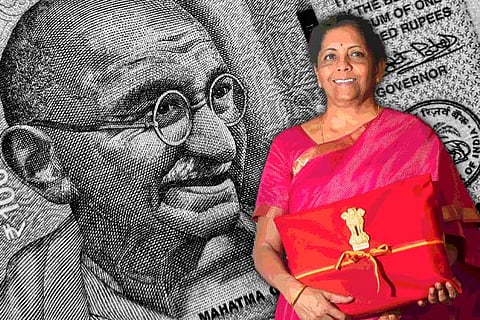

From solarising pumping sets, encouraging usage of traditional and organic fertilisers to rapid transportation of farm produce by railway and air, the Union Finance Minister Nirmala Sitaraman on Saturday announced a 16-point programme for agriculture and rural development sector. Presenting the Union Budget for the financial year 2020-21, the Minister also announced an increase in the funds allocated to the farmers, anticipating it to be a major boost to the farming sectors.
A fund of Rs 2.83 lakh crore has been allocated for the Agriculture and Rural Development sector in the new budget.
In the previous fiscal year, the government had allocated Rs 1.3 lakh crore for agriculture and Rs 1.20 crore for rural development. The current budget allocates Rs 1.68 lakh crore agriculture and allied activities, and Rs 1.23 lakh crore for irrigation and rural development. The 2020 budget has increased allocation to the farming sector by Rs 35,000 crore.
“Our government is focused on doubling farmers income by 2025 with a focus on pulses and irrigation. Prosperity to farmers can be ensured by making farming competitive. The distortion of farm and livestock market needs to be removed and there is a need for copious improvement of the agricultural sector,” Nirmala Sitaraman said.
The 16-point programme
The Union government is focusing on gathering support for the implementation of three new legislation passed since 2016 including the Model Agriculture Land Leasing Act, 2016, Model Agriculture Contract Farming Act, 2018 and Model Agriculture Produce and Livestock Marketing Act, 2017.
The Union government proposes to identify and provide support to 100 water-stressed districts.
The budget also focused on pushing solar energy by offering incentives to farmers. Under Prime Minister Kisan Yojana, the Finance Minister proposed that 20 lakh farmers will be able to set up standalone solar energy plants on barren land. The government also proposed that 15 lakh farmers will be able to solarise their grid-connected pump sets through this scheme.
“Solar power generation on barren lands and would be operationalised. Farmers who have barren land can send the power to the grid. They will be able to make a living out of it,” she said.
The government also proposed including all kinds of fertilisers, including traditional and organic types, as the prevailing regime encourages excessive use of chemical fertiliser. The budget also proposed that the National Bank for Agriculture and Rural Development (NABARD) would geo-tag and map the existing agriculture warehouses at block and taluk level.
The budget proposed that the National Food Corporation and the Central Warehousing Corporation would construct warehouses in their own land, too. In order to prioritise storage of produce at the local level, the government has proposed the village storage scheme to be run by women-run self-help groups.
The Indian Railways will set up ‘Kisan Rail’ through public-private partnership (PPP) model, where special coaches will be allocated in coaches and express trains for transporting farm produce. Additionally, separate freight trains will be allocated for transportation of produce.
Krishi Udan will be introduced by the Ministry of Civil Aviation for transportation of farm produce in international and national routes. “This is to value realization in the north-east and tribal districts,” the Finance Minister said.
The budget also proposes cultivation of cluster products, where each district would focus on one cultivating in order to boost the horticulture sector. The budget also encourages zero budget natural farming and online national organic products market.
The government proposed to increase agricultural credit target to Rs 15 lakh crore by 2025. “All beneficiaries of the PM Kisan Yojana will be covered under the Kisan Credit Card scheme. The focus will be on developing fodder farms and doubling of milk production from 55.8 million metric tonnes to 108 million metric tonnes by 2025,” Nirmala Sitaraman said.
The budget proposed boosting the ‘blue economy’ for the development and management of marine fisheries. The government proposed setting up of youth-run ‘sagar mitra’ centres and 500 fish farmer producer organisations to encourage the cultivation of algae and seaweed. The budget also proposed introducing 58 lakh new self-help groups under the Deendayal Antyodaya Yojana.